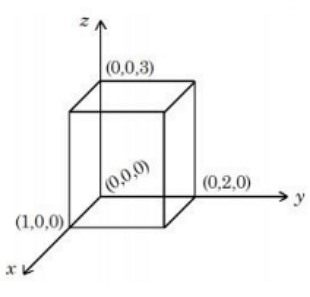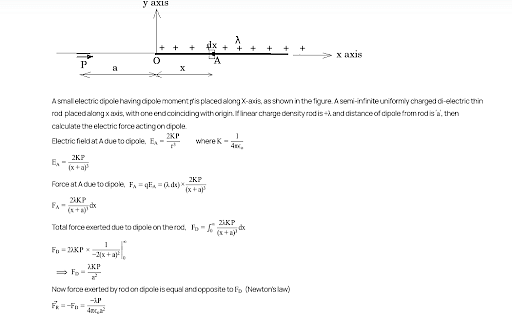Question:
A hollow sphere of radius 'r' encloses an electric dipole composed of two charges +q and -q. The net flux of electric field through the surface of the sphere due to the enclosed dipole is:
A hollow sphere of radius 'r' encloses an electric dipole composed of two charges +q and -q. The net flux of electric field through the surface of the sphere due to the enclosed dipole is:
Updated On: Jun 8, 2024
\(\frac{2q}{ε_{0}}\)
\(\frac{2q}{ε_{0}}\)4\(\pi\)r2
infinite
Zero
\(\frac{q}{ε_{0}}\)
Hide Solution
Verified By Collegedunia
The Correct Option is D
Solution and Explanation
The correct answer is (D):Zero
Was this answer helpful?
1
0
Top Questions on Electrostatic potential
- As shown in figure, a cuboid lies in a region with electric field \(E=2 x^2 \hat{i}-4 y \hat{j}+6 \hat{k} N / C\). The magnitude of charge within the cuboid is \(n \epsilon_0 C\). The value of \(n\) is _____. (if dimension of cuboid is \(1 \times 2 \times 3 m ^3\) )

- JEE Main - 2023
- Physics
- Electrostatic potential
- Three identical particle $A, B$ and$ C$ of mass $100 \,kg$ each are placed in a straight line with $AB = BC =13 \,m$ The gravitational force on a fourth particle $P$ of the same mass is $F$, when placed at a distance $13\, m$ from the particle B on the perpendicular bisector of the line $AC$ The value of $F$ will be approximately :
- JEE Main - 2023
- Physics
- Electrostatic potential
- Eight copper wire of length $l$ and diameter $d$ are joined in parallel to form a single composite conductor of resistance $R$ If a single copper wire of length $2 l$ have the same resistance $(R)$ then its diameter will be ______$d$
- JEE Main - 2023
- Physics
- Electrostatic potential
- Two parallel plate capacitors of capacity $C$ and $3 C$ are connected in parallel combination and charged to a potential difference $18\, V$ The battery is then disconnected and the space between the plates of the capacitor of capacity $C$ is completely filled with a material of dielectric constant $9$ The final potential difference across the combination of capacitors will be______ $V$
- JEE Main - 2023
- Physics
- Electrostatic potential
A point source of light is placed at the focus of a concave mirror. Consider only paraxial rays. The shapes of the wavefronts of incident and reflected lights respectively are:
- TS EAMCET - 2023
- Physics
- Electrostatic potential
View More Questions
Questions Asked in KEAM exam
- If the two sides AB and AC of a triangle are along \(4x-3y-17 = 0\) and \(3x+4y-19= 0\), then the equation of the bisector of the angle between AB and AC is ?
- KEAM - 2023
- Straight lines
- An average frictional force of 80N is required to stop an object at a distance of 25m. If the initial speed of the object is 20m/s,the mass of the object is:
- KEAM - 2023
- work, energy and power
- A biased die is rolled such that the probability of getting k dots,1≤k≤6, on the upper face of the die is proportional to k. Then the probability that five dots appear on the upper face of the die is
- KEAM - 2023
- Probability
- A planet has an escape speed of 10km/s,The radius of the planet is 10,000km. The acceleration due to gravity of the planet at its surface is:
- KEAM - 2023
- Gravitation
- \(∫xlog(1+x^2)dx=\)?
- KEAM - 2023
- Integration by Parts
View More Questions
Concepts Used:
Electric Dipole
An electric dipole is a pair of equal and opposite point charges -q and q, separated by a distance of 2a. The direction from q to -q is said to be the direction in space.
p=q×2a
where,
p denotes the electric dipole moment, pointing from the negative charge to the positive charge.
Force Applied on Electric Dipole




